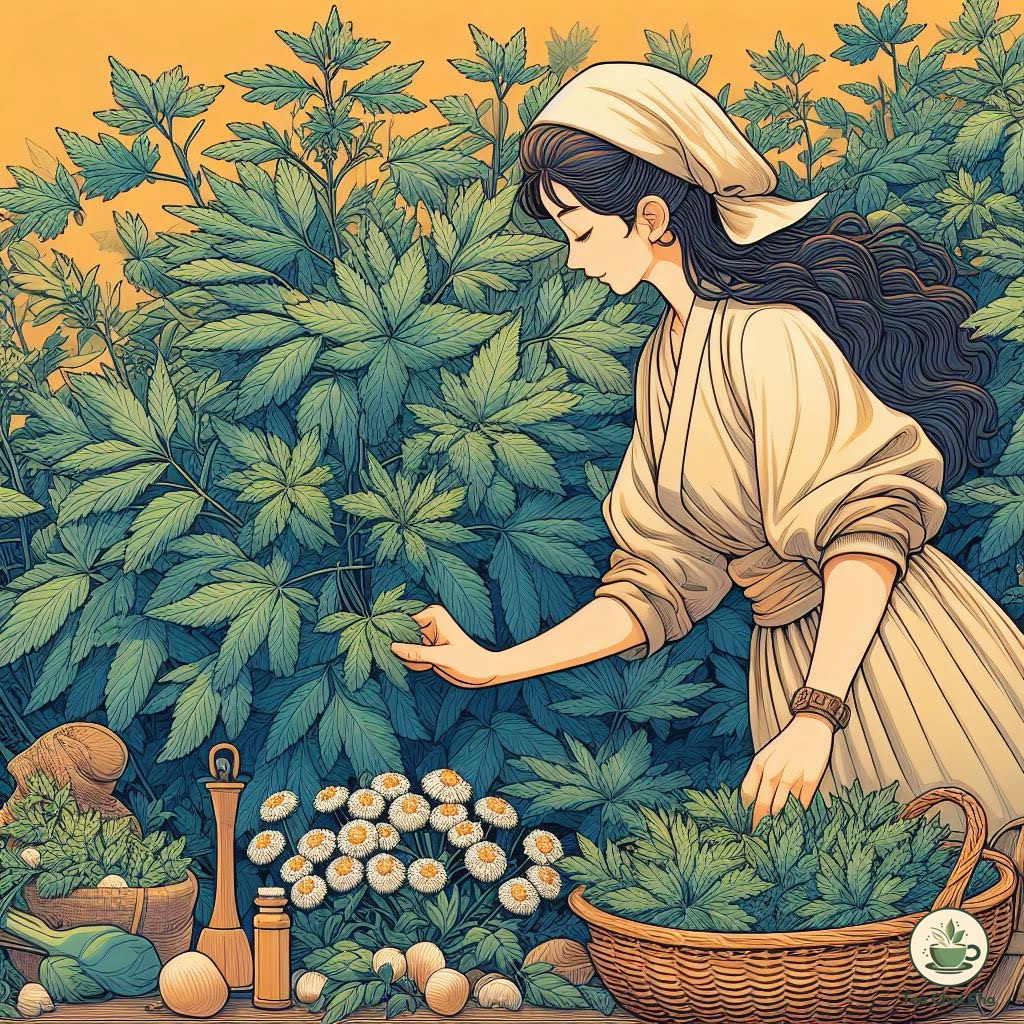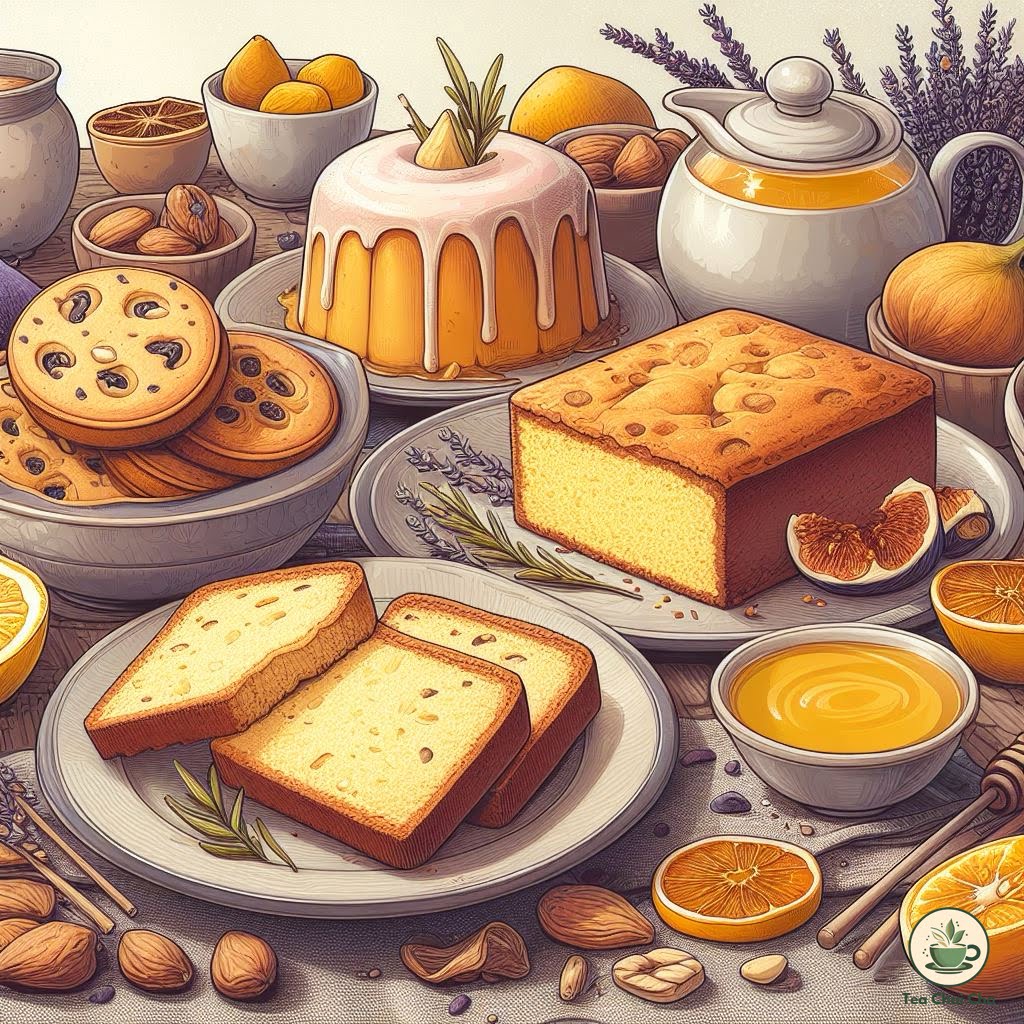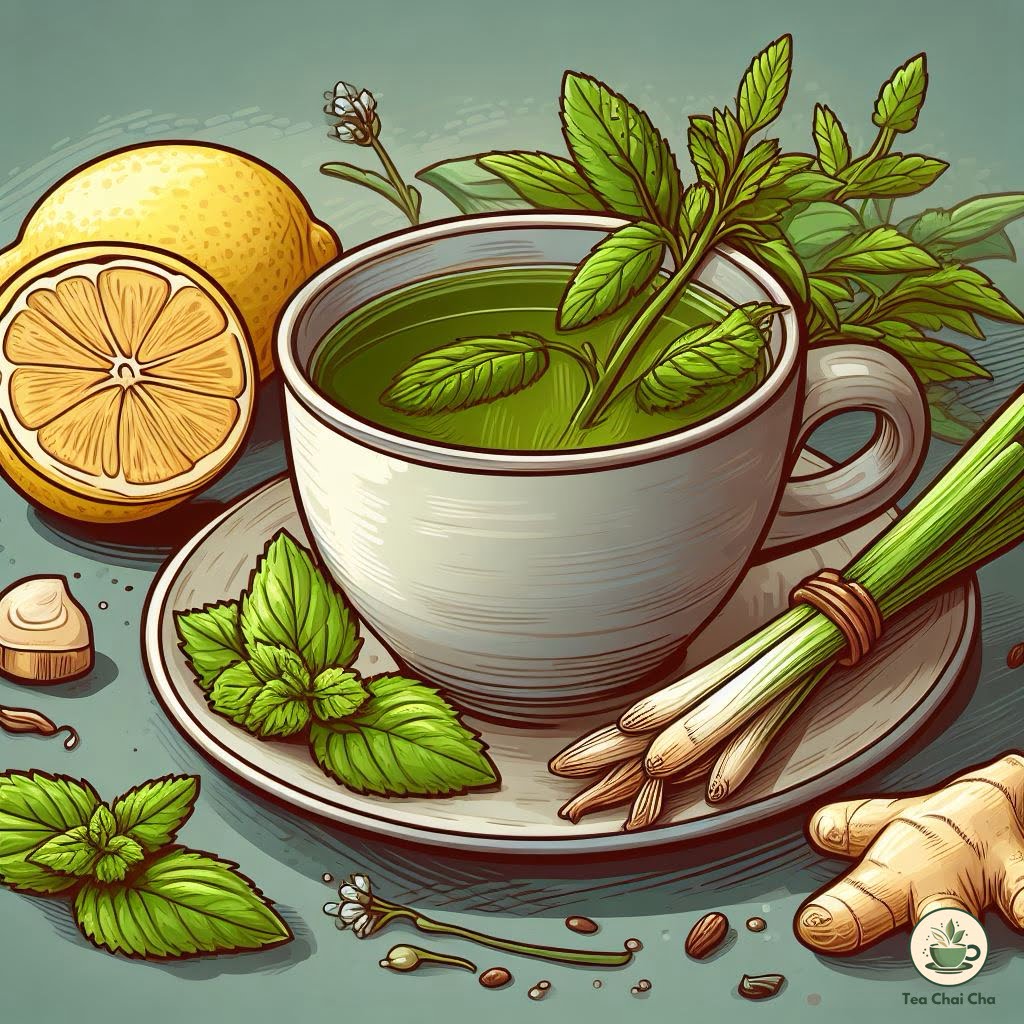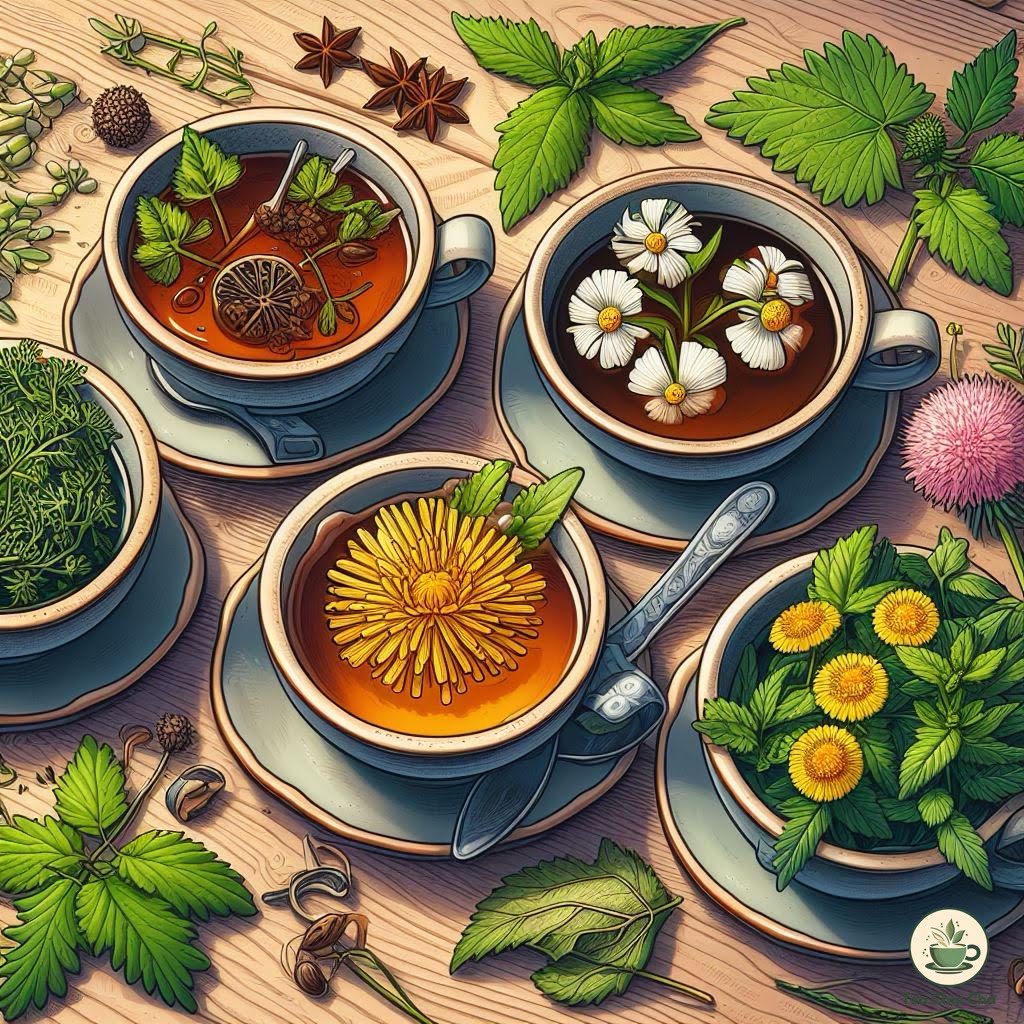You’ve probably (already) wondered how a raggedy garden weed, mugwort, ended up in your teacup.
But here’s the real puzzle you can’t resist – what does mugwort tea taste like?
Mugwort tea carries a distinct herbal flavor. Its taste is often described as bitter with earthy undertones. Some people detect a subtle spiciness or camphor-like note in its profile. You may also notice hints of mint and sage in its taste profile.
The overall taste is mildly astringent, and it might remind you of a slightly bitter green/black tea with a touch of herbal bitterness.
The flavor can vary depending on the preparation and the specific variety of mugwort used.
Now that you know the taste of mugwort, you must want to learn the reason behind it!

Why Does Mugwort Tea Taste So?
Mugwort tea tastes the way it does because of the chemical components it contains.
These compounds, like artemisinin, thujone, and various volatile oils, interact to create its distinctive flavor.
Artemisinin contributes the bitterness, while thujone and the volatile oils bring out the herbaceous and slightly minty undertones that you can taste.
The particular species of mugwort and the way it’s grown can also impact the taste, making it unique to each batch.
4 Different Tastes of Mugwort Tea
When you sip Mugwort tea, you’ll notice tasting notes that are all about your taste experience.
The taste of Mugwort tea is unique, and it might change depending on how you make it or which type of Mugwort you use.
1. Bitterness with an Earthy Undertone
Mugwort tea has a noticeable bitterness, which might not be your favorite, but it’s part of what makes this tea what it is.
This bitterness comes from compounds like sesquiterpene lactones.
It’s this bitterness that gives the tea its characteristic sharpness, even though it might take some getting used to.
2. Earthy and Herbal
Along with the bitterness, you’ll sense an earthy and herbal undertone.
These are there because of the terpenes and essential oils in Mugwort, like myrcene and thujone.
These notes give the tea a grounding and calming effect on your palate.
3. A Hint of Sweetness and Mintiness
Believe it or not, Mugwort tea can have a tiny bit of sweetness and mintiness.
This unique combo comes from compounds like coumarin and limonene.
While they aren’t the main flavors, they add a little extra complexity and balance to your sipping experience.
4. Aromatic and Floral Nuances
Mugwort tea may also offer you some aromatic and floral hints, even though they’re not as strong as in some other teas.
You can thank compounds like linalool and alpha-pinene for these delicate and fragrant touches.
They add a bit of extra charm to your tea.
What Do Different Mugwort Teas Taste Like?
Mugwort tea is known for its unique flavors, and the taste can vary depending on the specific type of mugwort used.
Here’s a breakdown of what you can expect from different mugwort teas.
1. Artemisia Vulgaris (Common Mugwort) Tea
Common mugwort tea has a bitter and earthy flavor with a slightly sweet undertone.
The bitterness is a defining characteristic, which some people find enjoyable and others may need time to acquire a taste for.
It’s often described as having a herbaceous quality with a hint of greenness.
2. Japanese Mugwort (Yomogi)
Artemisia Princeps, Japanese mugwort, or Korean mugwort, also known as Yomogi, offers a mugwort tea with a unique and somewhat sweet, grassy taste.
Unlike common mugwort, Yomogi mugwort tea is often noted for being milder and less bitter.
This makes it a preferred choice for those looking for a gentler mugwort experience.
3. Artemisia lactiflora (Chinese Mugwort) Tea
Artemisia lactiflora, White Mugwort, or Chinese mugwort tea, boasts a robust and rich flavor profile.
It’s known for its strong bitterness but with an interesting complexity of taste.
Some drinkers may detect hints of citrus and floral notes, adding depth to its overall flavor.
4. Artemisia douglasiana (Dream Plant) Tea
Artemisia douglasiana or California Mugwort, also called the Dream Plant, has a distinctive bitter taste.
But it is often noted for its piney and resinous undertones.
This mugwort tea is unique and can be an acquired taste for some, while others appreciate its woodsy and aromatic notes.
5. Mugwort Blends
Mugwort tea is sometimes blended with other herbs and teas to create unique flavor profiles.
The taste of these blends will depend on the additional ingredients used, which can range from minty and refreshing to earthy and grounding.

7 Tips to Pick the Best Tasting Mugwort for Tea
When choosing mugwort for your tea, you want to ensure that you get the best-tasting leaves to make your brew enjoyable.
Follow my tips to pick the right mugwort for a flavorful and aromatic tea experience.
1. Choose Fresh and Vibrant Leaves
Look for mugwort leaves that are fresh and vibrant in color.
Avoid any that appear wilted, discolored, or have visible signs of damage.
Freshness plays a significant role in the overall taste of your tea.
2. Go for Younger Leaves
Younger mugwort leaves tend to be less bitter and have a milder flavor compared to older leaves.
Opt for the tender, smaller leaves for a more palatable tea.
They are often located at the top of the plant.
3. Smell the Aroma
Give the mugwort leaves a good sniff.
The leaves should have a pleasant, earthy aroma with a hint of sweetness.
If the scent is too strong or unpleasant, it may result in a bitter-tasting tea.
4. Consider the Plant’s Location
Mugwort tends to absorb flavors from its surroundings.
So, make sure to pick leaves from an area free of pollution and contaminants.
Wild-grown mugwort in clean environments is a good choice.
5. Taste a Small Sample
If possible, taste a small piece of the leaves raw before making your tea.
It will give you a clear idea of the flavor.
If the bitterness is overwhelming, consider blending it with other herbs or adjusting the steeping time to mellow the taste.
6. Choose the Right Variety
There are different varieties of mugwort, each with its unique flavor profile.
Some (Japanese mugwort) may be more suitable for tea than others (Chinese mugwort.)
Research the specific variety you plan to use to ensure it aligns with your taste preferences.
7. Harvest at the Right Time
Timing matters. Harvest mugwort leaves before the plant flowers.
The flavor tends to be less bitter during this stage.
Avoid harvesting too late, as it may result in a stronger, less pleasant taste.
What Flavors Pair Well with Mugwort Tea
Mugwort tea has a unique herbal taste that can be complemented with various flavors, both savory and sweet.
Let’s explore some delicious pairings for your mugwort tea.

Savory Pairings
When it comes to savory pairings, mugwort tea goes well with dishes that have earthy and herbal undertones.
- Sage and Thyme Roasted Chicken: The aromatic herbs in mugwort tea match perfectly with sage and thyme-seasoned roasted chicken. The combination offers a delightful herbal fusion.
- Mushroom Risotto: Mugwort’s slightly bitter notes balance the richness of a creamy mushroom risotto, creating a harmonious blend of flavors.
- Grilled Vegetables: Grilled vegetables, such as zucchini, bell peppers, and asparagus, pair wonderfully with mugwort tea. The smoky char of the veggies complements the tea’s herbal essence.

Sweet Pairings
On the sweet side, mugwort tea can be paired with desserts and treats to satisfy your sweet tooth.
- Lemon Pound Cake: The zesty tang of lemon pound cake contrasts nicely with mugwort tea’s earthy flavor, creating a sweet and slightly herbal combination.
- Honey and Almond Biscuits: A drizzle of honey on almond biscuits complements the slightly bitter undertones of mugwort tea, offering a balanced and satisfying treat.
- Lavender Shortbread Cookies: Lavender-infused shortbread cookies add a floral note that pairs beautifully with the herbal character of mugwort tea, creating a delightful dessert experience.
- Dried Fruits: If you’re looking for something fruitier, consider dried apricots or figs, as their natural sweetness can complement the tea’s character.

Herbal Companions
Mugwort tea pairs well with other herbal flavors.
If you enjoy a bit of complexity, consider infusing your tea with a touch of lemongrass, mint, or ginger.
These herbs can enhance the flavor profile of your mugwort tea, making it more refreshing and enjoyable.

10 Teas That Taste like Mugwort Tea
If you’re looking for teas with earthy flavors like Mugwort tea, it’s likely for the unique taste experience rather than personal preference.
Here’s a list of teas you can explore:
- Wormwood Tea: Like Mugwort, Wormwood is a member of the Artemisia family and shares similar earthy notes. It can be a good alternative for those who appreciate the distinct earthiness of Mugwort.
- Dandelion Root Tea: Dandelion root tea has an earthy and slightly bitter taste. It’s not identical to Mugwort, but it does have a similar earthy quality that you might find intriguing.
- Nettle Tea: Nettle tea has a grassy and earthy flavor. While it’s not exactly like Mugwort, the earthy undertones are somewhat reminiscent.
- Burdock Root Tea: Burdock root tea offers a woody and earthy taste. It’s different from Mugwort, but the earthy character is a common thread.
- Yerba Mate: Yerba Mate has a smoky and earthy taste, with herbal undertones. It might not match Mugwort precisely, but it could be of interest if you enjoy earthy flavors.
- Chicory Root Tea: Chicory root tea has a roasted and slightly nutty flavor with earthy undertones. It’s distinct from Mugwort but carries some earthy notes.
- Ginseng Tea: Ginseng tea has a unique, earthy bitterness, which is different from Mugwort but may appeal to those who appreciate strong, herbal flavors.
- Eleuthero Root Tea: Eleuthero root tea has a mild earthy taste with woody notes. While it’s not a mirror image of Mugwort, the earthiness might intrigue you.
- Elderflower Tea: Elderflower tea has a delicate, floral character with mild earthy undertones. It’s a departure from Mugwort but offers a unique flavor profile.
- Pine Needle Tea: Pine needle tea has a resinous, earthy taste with hints of pine. It’s quite different from Mugwort but falls within the realm of earthy teas.
Before trying Mugwort or any mentioned teas, consult a healthcare professional, especially if you have health concerns or are pregnant. Their guidance ensures a safe and personalized tea experience that aligns with your unique health requirements.

